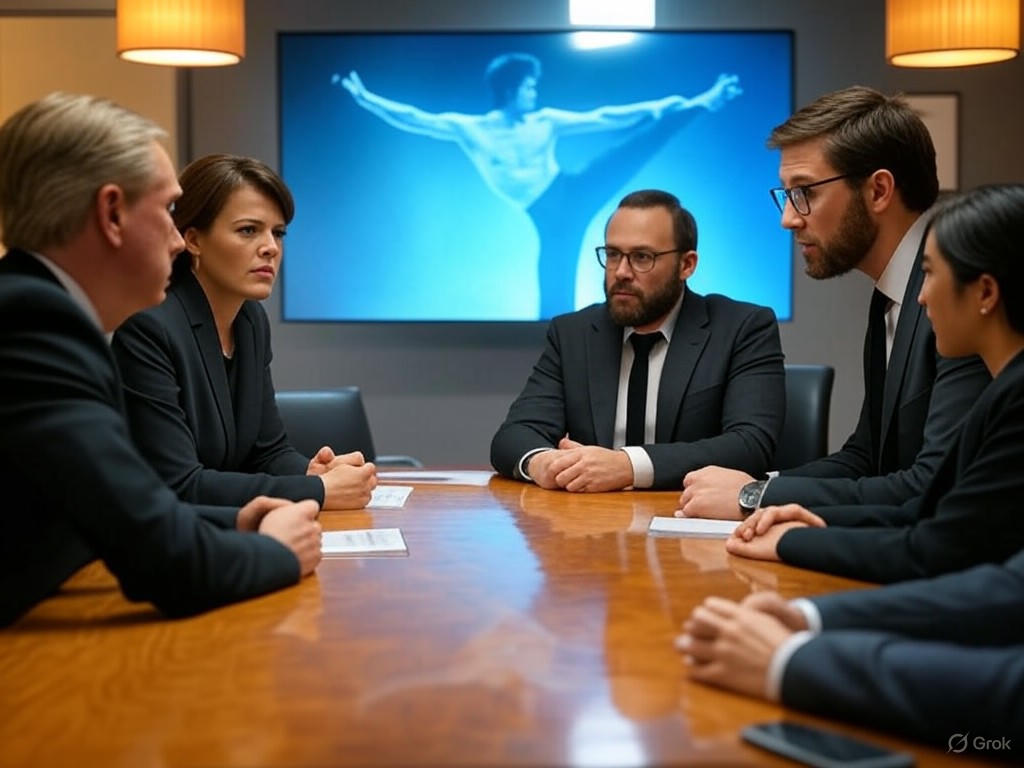AI in Chinese Cinema: Reviving Bruce Lee’s Legacy
In the ever-evolving tapestry of global cinema, technology has emerged as both a savior and a specter, breathing new life into dusty reels while raising questions about authenticity and control. Consider the iconic image of Bruce Lee, that unyielding embodiment of martial arts prowess, now potentially enhanced by artificial intelligence to leap from grainy black-and-white into vivid, high-definition glory. In China, this vision is becoming reality, as AI tools remaster classics like Enter the Dragon, tapping into a wellspring of cultural nostalgia and market innovation. Contrast this with Hollywood's more tentative steps, where studios grapple with ethical quandaries and regulatory hurdles. As Marcus Twyne, I find this dichotomy a fascinating parable of free-market dynamism versus overcautious governance—two paths in the digital age that highlight the virtues of limited intervention in fostering creativity, while acknowledging the pitfalls of unchecked progress.
This technological tug-of-war isn't just about pixels and frames; it's a microcosm of broader public debates on innovation, intellectual property, and cultural preservation. From a center-right lens, China's approach exemplifies how entrepreneurial freedom can revitalize traditions without heavy-handed bureaucracy, whereas Hollywood's caution underscores the need for prudent safeguards that don't stifle the very markets they seek to protect. Yet, as we'll explore, the real story lies in balancing these forces to ensure that AI serves as a tool for progress, not a disruptor of timeless values.
The Chinese Cinema Renaissance: AI as a Catalyst for Cultural Revival
China's embrace of AI in remastering martial arts epics like Bruce Lee's films is nothing short of a cinematic revolution, driven by a blend of technological prowess and market incentives. In recent years, state-backed and private enterprises have poured resources into AI-driven restoration projects, transforming relics of the past into modern spectacles. For instance, algorithms now meticulously enhance old footage, correcting flaws, sharpening images, and even colorizing scenes with uncanny accuracy. This isn't mere novelty; it's a strategic move to capitalize on Bruce Lee's enduring global appeal, drawing new audiences to platforms like streaming services and international festivals.

A dynamic AI-enhanced scene from Bruce Lee's Enter the Dragon, showcasing how technology revives the intensity of his legendary fights for a new generation of viewers.
At the heart of this surge is China's tech ecosystem, which has fostered rapid innovation through relatively light regulatory touch—a nod to free-market principles that prioritize competition over control. According to a report from The Wall Street Journal, Chinese firms like Tencent and ByteDance are leading the charge, leveraging AI not just for entertainment but as an economic engine. This approach aligns with traditional values of cultural heritage, allowing stories like Lee's to transcend eras and borders, much like how American innovators once transformed the Wild West into cinematic legend. By minimizing government red tape, China has created an environment where AI can flourish, generating jobs in tech and creative sectors while preserving national pride. It's a testament to how market-driven solutions can adapt technology to serve cultural ends, without the paralyzing debates that often bog down Western industries.
Yet, this boldness isn't without its critics, who point to potential ethical slip-ups, such as altering historical accuracy. Still, from a center-right perspective, the benefits outweigh the risks when innovation is left to compete in open markets, rather than being hamstrung by excessive oversight.
Hollywood's Cautious Stance: Prudence in the Face of Disruption
Across the Pacific, Hollywood's relationship with AI is markedly more restrained, a reflection of an industry steeped in tradition and wary of technological upheaval. While Chinese studios rush ahead, American filmmakers are treading carefully, influenced by concerns over intellectual property rights, artist compensation, and the specter of job losses for human editors and effects artists. Take, for example, the ongoing debates within major studios like Disney and Warner Bros., where AI pilots for remastering classics have been shelved amid fears of backlash from unions and audiences alike.
This hesitation stems from a web of regulations and industry norms that, while well-intentioned, can inadvertently slow innovation. Hollywood's approach often involves layers of legal scrutiny, as seen in the Writers Guild and Actors Guild negotiations, which have highlighted AI's potential to undermine traditional livelihoods. A detailed analysis from IEEE Spectrum reveals that while AI could democratize filmmaking—making high-quality remastering accessible to smaller studios—the U.S. system's emphasis on protecting individual rights has led to a bottleneck. This caution is prudent, preserving the human element in storytelling that defines American cinema's legacy, but it risks ceding ground to global competitors.

A panel of filmmakers and technologists debating AI's role in cinema, illustrating the industry's careful balance between innovation and ethical responsibility.
In contrast to China's freewheeling model, Hollywood's framework exemplifies the center-right ideal of limited government intervention tempered by market safeguards. As Variety's industry insights note, this has resulted in a slower adoption curve, with AI largely confined to experimental projects rather than widespread remastering. Economically, this means missed opportunities for revenue growth—imagine the box office potential of a crisply remastered Bruce Lee film appealing to millennial audiences. Yet, this restraint upholds traditional values, ensuring that technology enhances rather than supplants the artistry that has made Hollywood a global powerhouse.
Weighing the Evidence: Innovation, Economics, and Cultural Impact
To unpack this contrast, let's examine the evidence. Data from global film markets show that China's AI investments have yielded tangible results: a 2025 report by The Hollywood Reporter's tech analysis indicates that remastered martial arts films have boosted domestic box office returns by up to 40%, thanks to enhanced visuals that attract younger viewers without altering core narratives. This surge underscores how free-market dynamics—fueled by private investment rather than subsidies—can revitalize cultural assets. Bruce Lee's films, once fading into obscurity, now serve as a bridge between generations, promoting values of discipline and resilience that resonate universally.
In Hollywood, however, the narrative is more mixed. Studies, including one from The New York Times' tech section, reveal that while AI could cut production costs by 20-30%, legal battles over AI-generated content have delayed projects. This isn't just about economics; it's about preserving the soul of cinema. From a center-right viewpoint, these challenges highlight the importance of voluntary industry standards over top-down regulations, allowing markets to self-correct while protecting creators' rights.
Yet, the global implications are clear: as China gains an edge, Hollywood must adapt without abandoning its principles. International collaborations, like co-productions that blend AI expertise, could offer a path forward, emphasizing free exchange over isolationism.
A Path Forward: Embracing Innovation with Wisdom
In conclusion, the tale of AI in global cinema—China's audacious remastering of Bruce Lee versus Hollywood's measured pace—serves as a reminder that technology's role in culture should be guided by market forces, not bureaucratic fiat. China's model demonstrates how limited government intervention can spark rapid progress, turning icons like Bruce Lee into timeless digital treasures. Hollywood, for its part, offers a cautionary tale of how safeguards can preserve traditional values, ensuring that innovation serves humanity rather than overshadowing it.
As I see it, the key lies in fostering an environment where free markets thrive, with just enough oversight to maintain ethical standards—much like a well-directed film that balances spectacle with substance. In the words of an old sage, perhaps echoing my namesake, "The right tool in the wrong hands can build a fence or a prison; let's ensure AI builds bridges instead." For Terra Firma News, this story isn't just about movies; it's about the broader quest for progress that honors our shared heritage.

